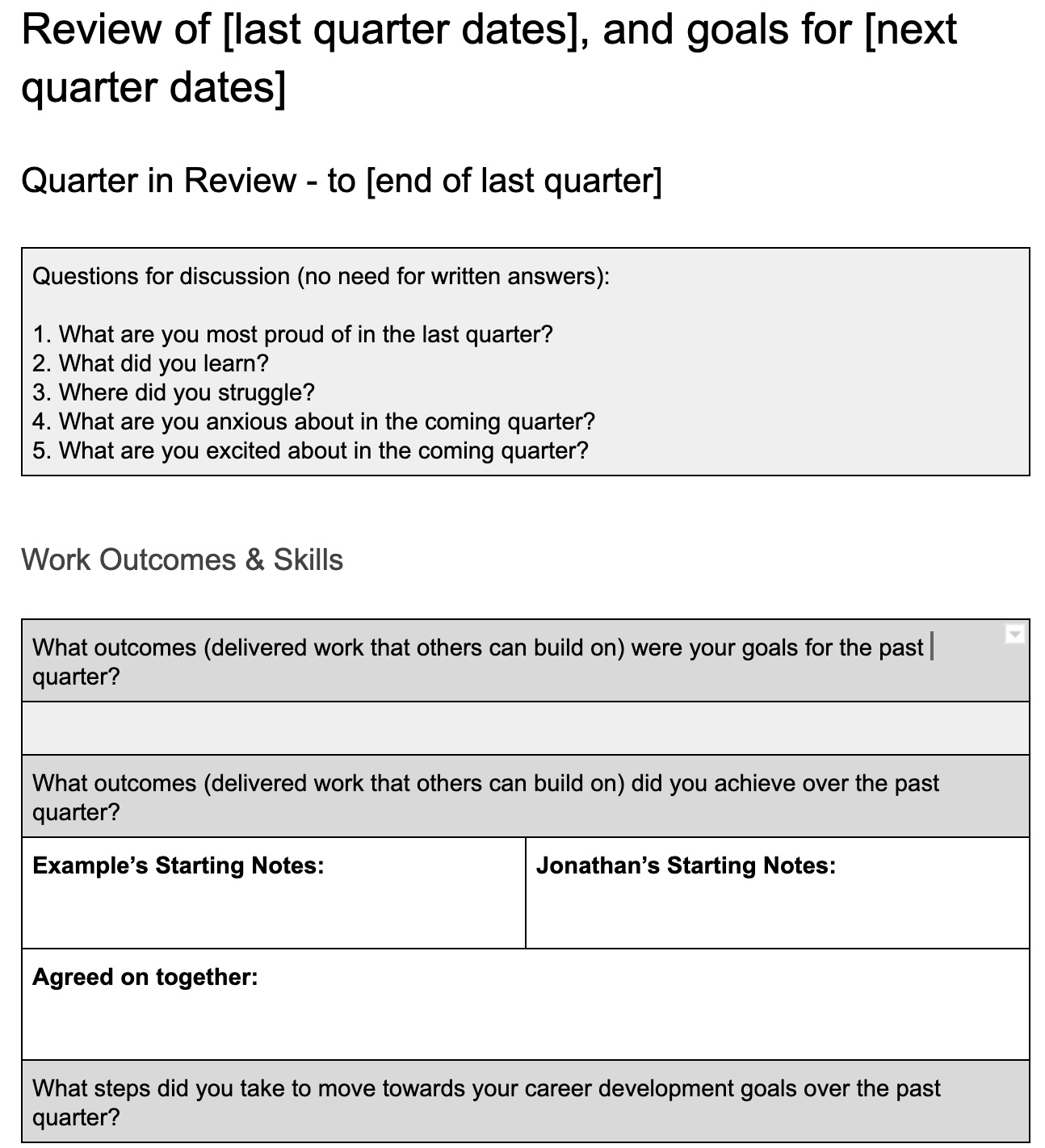#60 - Quarterly goal setting & review sessions
Plus: The resilience of mixed-seniority teams; Gaining mentors; Product manager skills; Postmortems from scratch
Hi there - if this is a long weekend for you, I hope you’re enjoying it.
Last time we spoke a little bit about expectations, and routine feedback to team members and peers when those expectations are met or not met. This time, let’s consider longer-timeline expectations: goal setting and review.
Feedback is a mechanism to align expectations with your team members in the moment, and to encourage meeting those expectations in the future. Sometimes those expectations were explicit; other times, they were implicit and it’s a helpful way of making them explicit. This is a simple, extremely useful and scandalously underused tool, particularly in research environments. What’s more, your team members want feedback. Do you want more feedback from your manager about how you’re doing? Why do you think your team members feel differently than you do?
On top of the small course-corrections of routine feedback, it’s important to have regular conversations looking back at previous goals, and setting future goals. Here, the expectations are very explicit - you are setting goals, and looking back to see if they’re set.
Our organizations probably have an annual review process set up for this. They’re often pretty poor. What’s more, a year is just an absurdly long time in many ares. For most of us, our work is changing rapidly; the idea that today we should have a pretty good idea of our work from now until April 2022 is just goofy.
Quarterly is a pretty good cadence to review work, learning, and career development goals with team members. Twelve-ish weeks is long enough to accomplish meaningful work, while being short enough that priorities probably haven’t shifted dramatically in the intervening time. These goals are things you absolutely can and should be talking about in one-on-ones, but setting some time aside every quarter just to have these goal-review and goal-setting conversations helps clarify expectations about goals, ends up with them written down, and gives team members clarity about what their priorities are. The resulting document is also something that can inform one-on-one discussions.
A template for the document I use for such reviews is available as a google doc here; I show an excerpt below. By having it as a google doc (or Office 365/sharepoint document, or whatever tools your team use routinely), it can be kept as a running document (most recent review on top), collaborated on, and frequently reviewed. What will be most useful for you and your team may well be different. I use these reviews as an occasion for a bit of a deeper check-in on how things are going in areas that sometimes get overlooked in the more day-to-day focus of one-on-ones.
The mechanics of these reviews is that we schedule a meeting outside of our usual one-on-ones; an hour is generally enough for a team member whose done this before, it might take more than that for a team member doing it the first time. I update the document by adding the review for the new quarter, taking goals set last review and copying them in; then each of us adds starting notes. The document covers:
Questions for discussion - finding out what they were proud of, struggled with, and learned in the last quarter, and anything they’re excited or anxious about in the next;
Reviewing past goals on, discussing whether they met expectations, and setting next-quarter goals on:
work outcomes
career development
skills development
Discussing what they need to work on in light of how they did on those goals, or due to other things that have happened in the last quarter - nothing in this discussion should be new or a surprise, it should all have been raised before in routine feedback
Setting, with their input, goals for the next quarter.
The meeting then discusses the starting notes from myself and the team member, and then agree to summaries and commit to future goals. Having their input on these sections is extremely valuable; it increases the commitment to the goals.
The first time a team member goes through this, it can be a little scary - people have had or heard of pretty terrible performance review experiences in the past, and they often don’t realize it’s an opportunity for a conversation about what’s going well, what haven’t, what priorities to work on, and their own learning and career development goals. To make it a little less difficult to start this the first time, when onboarding a new hire we immediately set 30 day goals in the worksheet, then after a month set goals for the remaining 60 days of the quarter. At the end of their first quarter we go through the sheet together for the first time, but it’s at least partially familiar to them so doesn’t seem so daunting.
Do you have a similar process? Have you seen anything similar or that you find works very well? Let me know - hit reply, or email jonathan@managerphd.com.
For now, on to the roundup!
Keep reading with a 7-day free trial
Subscribe to Manager, Ph.D. to keep reading this post and get 7 days of free access to the full post archives.





